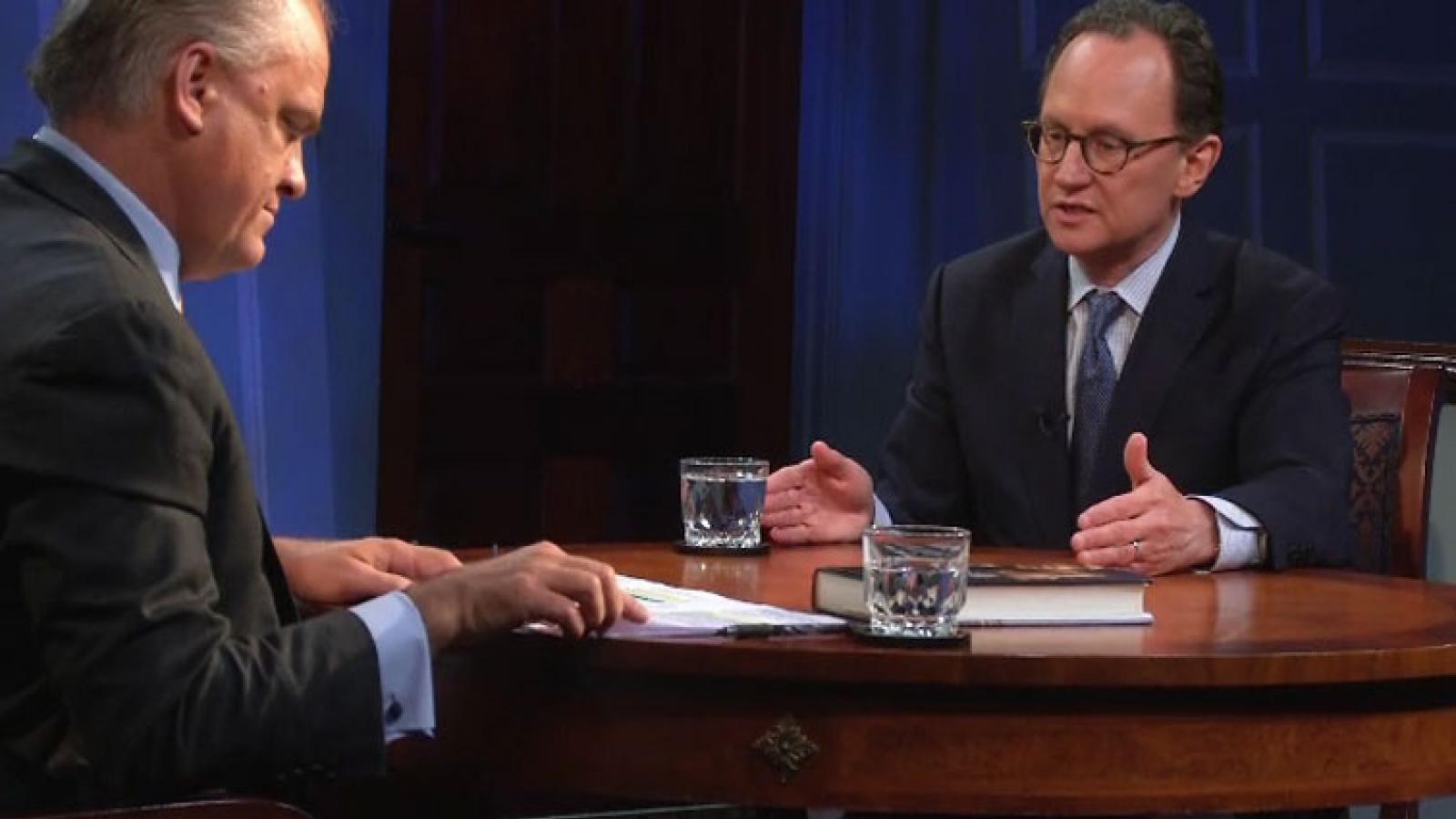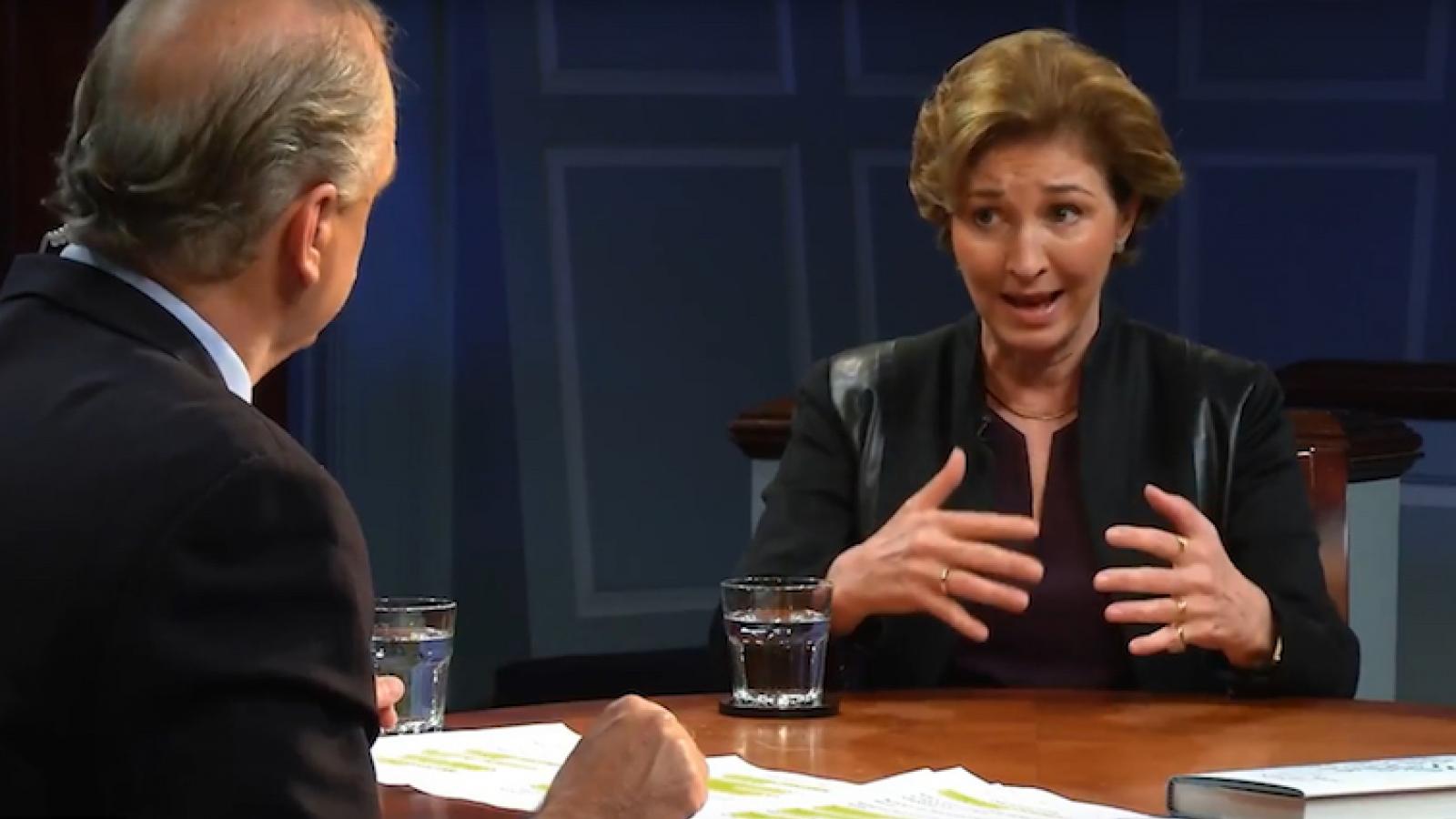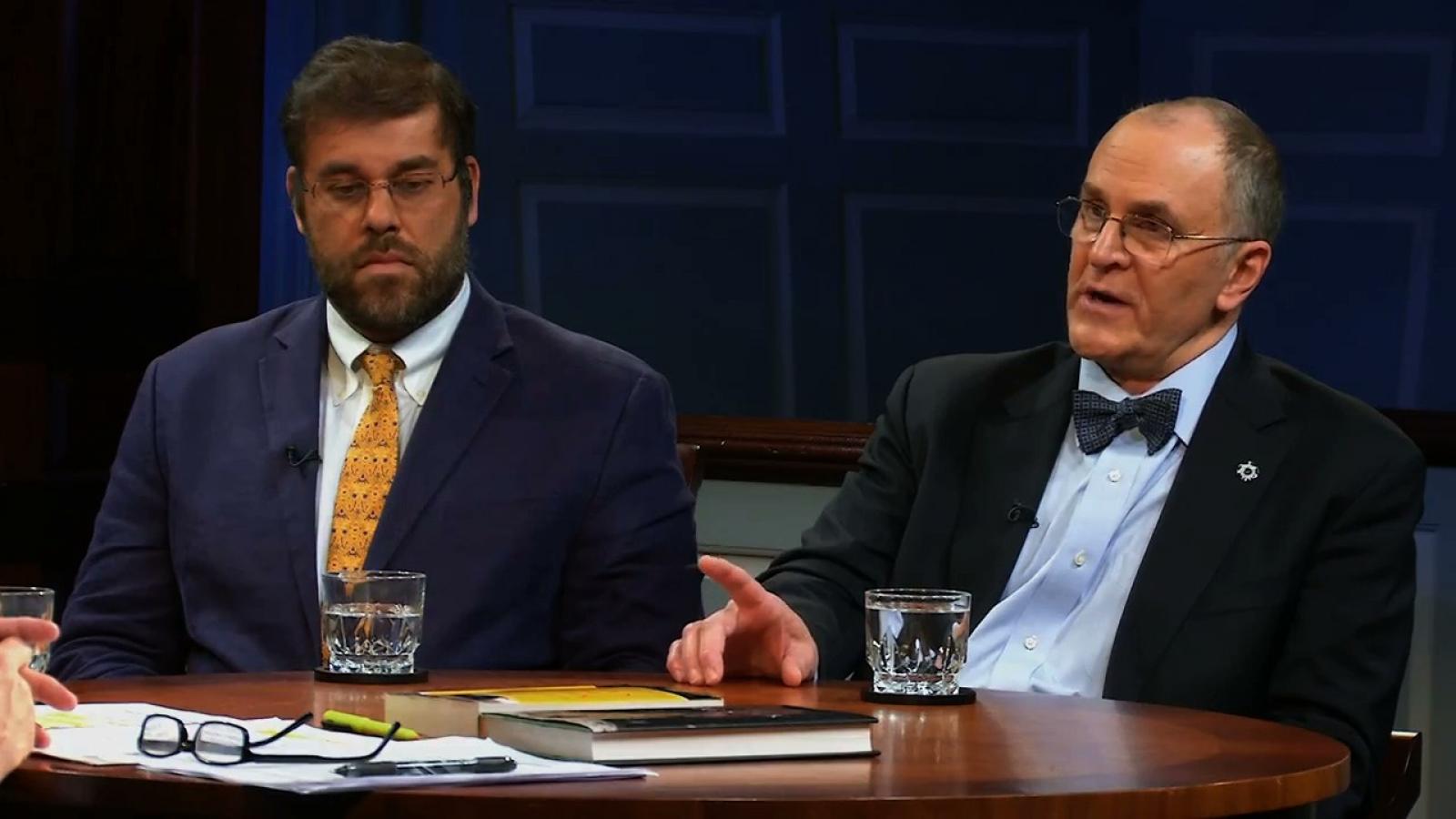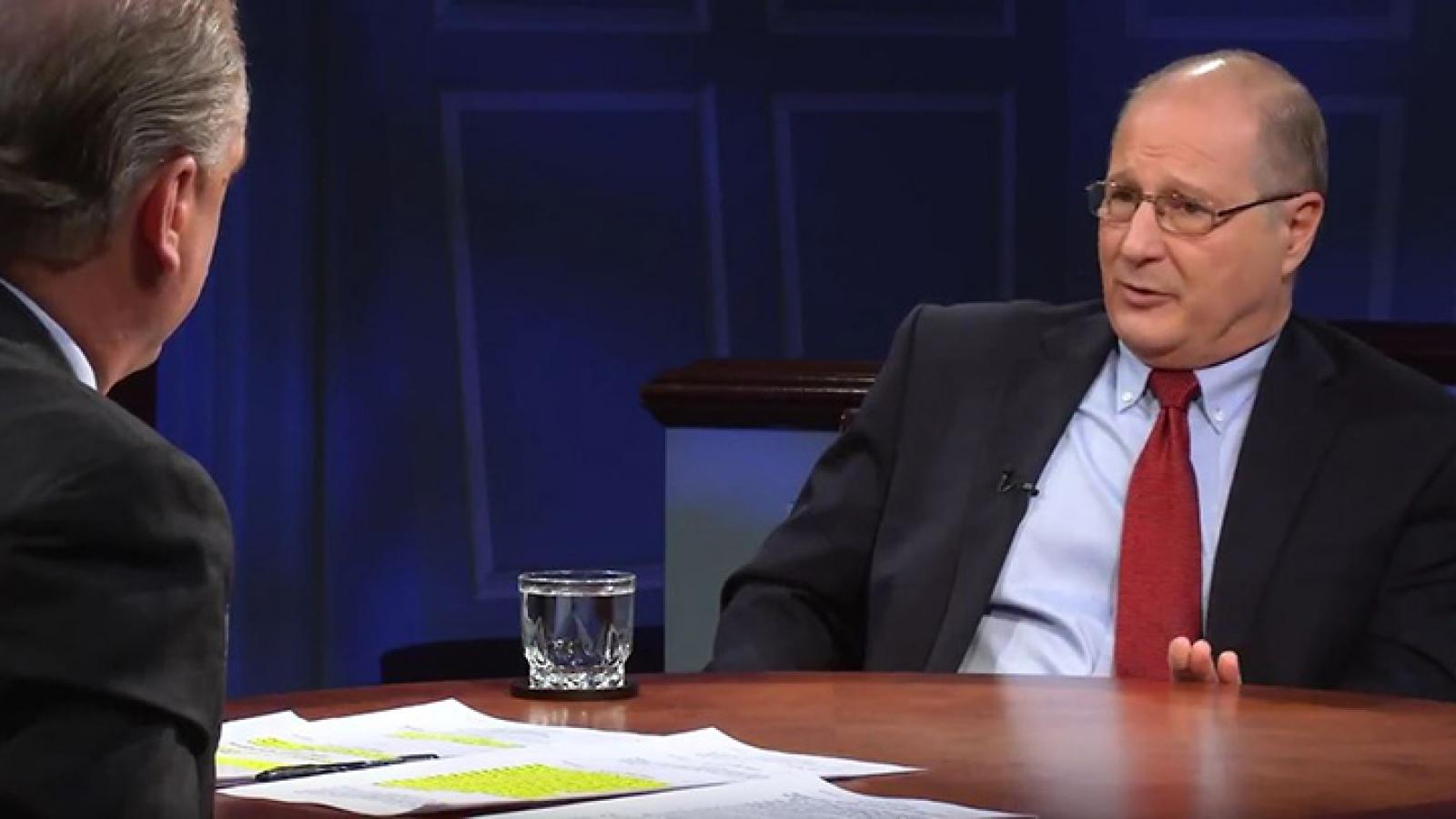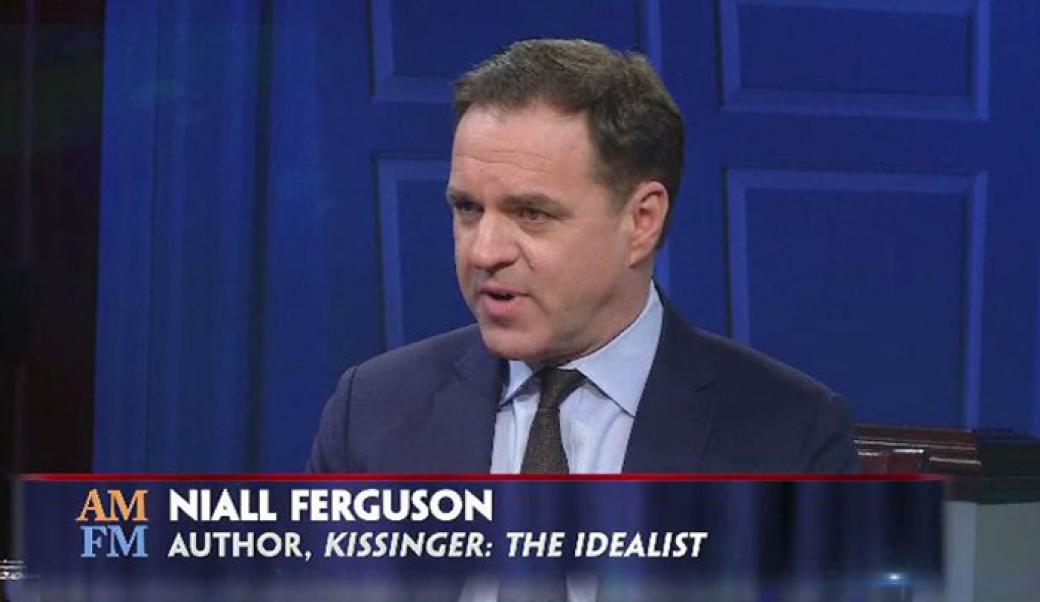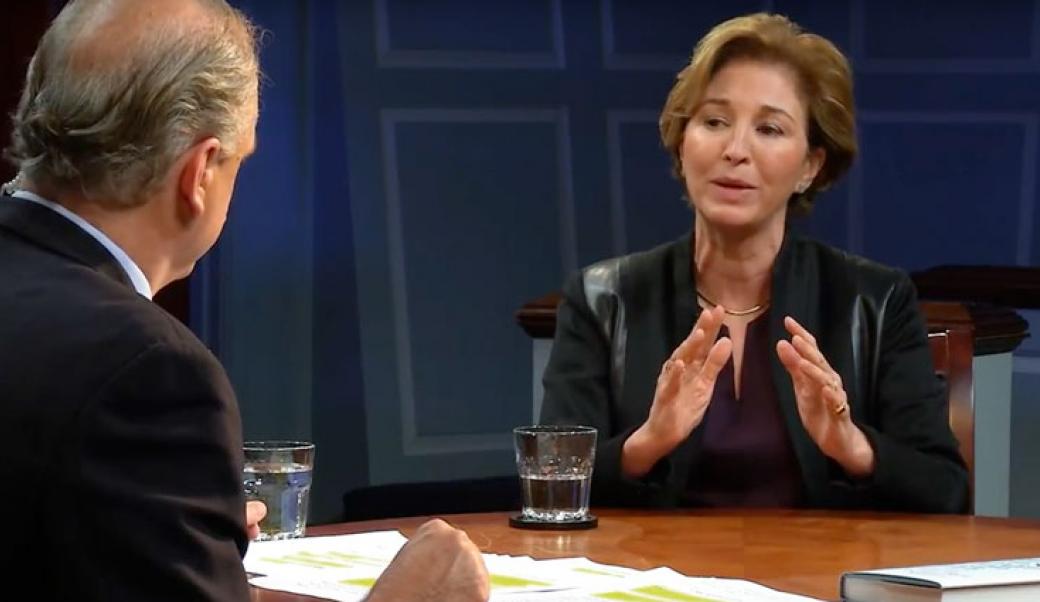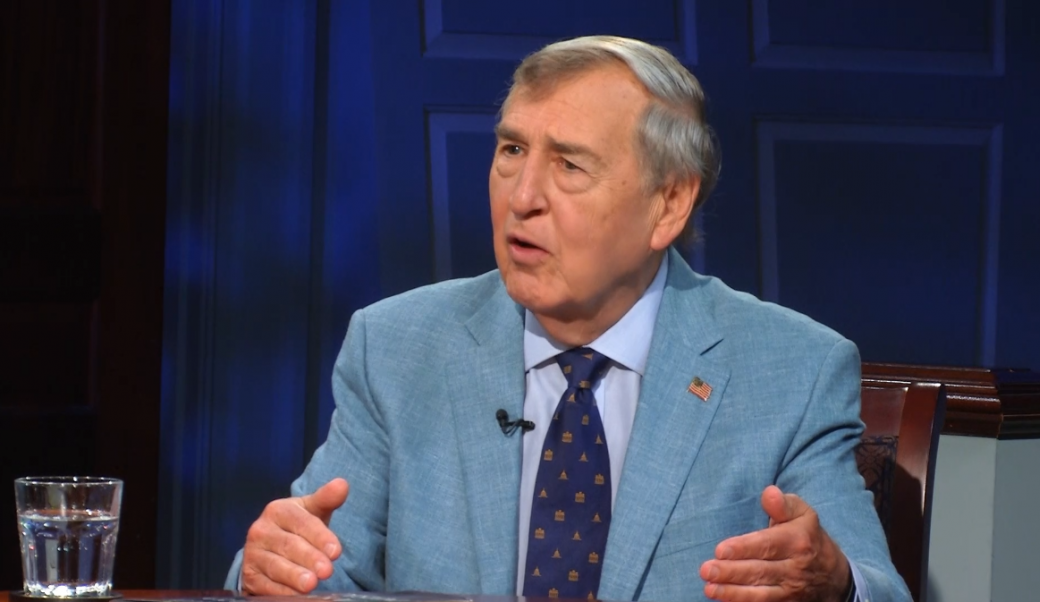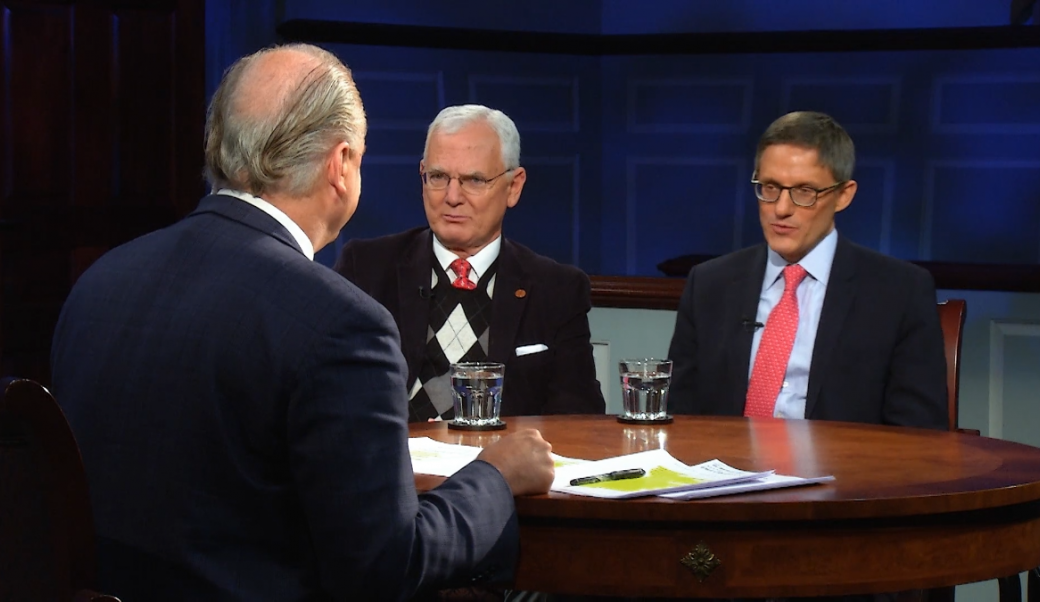About this episode
August 27, 2017
Is America stronger or weaker than it was a year ago? We take a look at the ramifications of President Trump's election for American foreign policy in a special report on Trump’s first year.
Foreign Affairs
Trump's first year on the global stage
Transcript
DOUGLAS BLACKMON: This week on American Forum, a look back at President Trump’s tumultuous first year on the global stage.
It’s about history, policy, and impact. A new perspective on current affairs, bringing experience, insight, civility and scholarship to the urgent issues today. It’s about our past, present, and future. Your host: Pulitzer Prize-winning author and journalist Doug Blackmon. From the University of Virginia's Miller Center, this is American Forum.
BLACKMON: Welcome back to American Forum. I’m Doug Blackmon. From Russia to North Korea, Syria and China, American foreign policy got a workout during the last year. In this episode, we take a look back at that roller coaster, and how President Donald Trump’s performance as a global leader has matched up to his campaign promises and the advice he got from our guests. One thing is certain—whether Republican or Democrat, liberal or conservative—our experts told us that the way foreign policy is executed today, is changing radically.
TIM NAFTALI: The old fashioned tools of foreign policy and diplomacy don’t work the same way they did.
ELIOT COHEN: I used to think that ideas, foreign policy concepts, were a lot more important than they really are. And they are important. They’re essential. But I think what I’ve learned is they’re, like, ten percent of the issue, maybe, and it’s ninety percent implementation, how you do it, and how well you do it, or how poorly you do it.
ANNE-MARIE SLAUGHTER: You need to see that world of states, those chessboards, but you also have to see that world of people, individuals, businesses, criminal networks, uh, nongovernmental organizations. And seeing that will give you a different calculus at least some of the time.
BLACKMON: We’ve all seen over the past decade—and certainly over the past year—how unpredictable and messy foreign policy can be. Is Russia our enemy tampering with elections, or our ally fighting ISIS terrorists? What’s more important—our alliance with Germany, France and the European Union—or long ties with Great Britain, our “mother country”? But even before the 2016 election, had there been a thoughtful debate?
JEREMI SURI: What was striking about this entire presidential election cycle—and this applies to both major candidates—is there was not a serious discussion in this troubled world we live in about the kind of world we as Americans want to see going forward.
BLACKMON: One thing has been clear—the stakes are very high. And we heard that from both the right and the left.
TIM NAFTALI: The American people have been led to assume the same kind of policy successes that they know we had at the end of the Cold War and the ’90s. You see the thing is we ran the table at the end of the ’80s. and the elite in power today are old enough to remember running the table. And they’re wondering why aren’t we running the table anymore?
JEREMI SURI: …and we have a president and a team that are not very well-informed, and have shown very little inclination to get themselves well-informed. They might have excellent intentions, but the history of American foreign policy is the history of the United States stumbling into conflicts because the United States is not well enough prepared, and because the United States does not understand the legacies of commitments it’s made perhaps in an earlier time in a particular region.
BLACKMON: Over the past eighteen months, we’ve had a big project on American Forum, and here at the University of Virginia’s Miller Center, talking to scholars, politicians and presidential advisors for advice to the new president on how to be successful in the crucial first year in office—when presidents often have their biggest accomplishments. As far as foreign policy, our experts didn’t all agree on what they thought President Trump should pursue. But they were on the same page as far as the risks and challenges faced by the country—North Korea, China, Syria, terrorism, and of course, the issue that has gotten more attention than any other: Russia.
Here’s Eliot Cohen, a top foreign policy advisor to the last Bush administration but a staunch critic of President Trump, soon after last year’s election.
ELIOT COHEN: The first and most important thing he has to do is stop talking about Vladimir Putin as if he’s a credible figure, and stop talking about Russia as if it is actually really a sort of viable partner in large parts of the world. I mean, I think the first thing you have to do is be realistic about what Russia is, what Putin’s Russia is, and what their objectives are.
BLACKMON: Donald Trump is not the first president to begin an administration with hopes of improving ties with Russia. In fact, all presidents in the last several decades had hoped to do that. But the confluence of Russia’s threats to the Baltic states, Poland, Ukraine, the news of Russian efforts to influence the 2016 U.S. election, and the ongoing investigation by special counsel Robert Muller III made the Russia situation particularly perilous.
RICH LOWRY: We sincerely want to know what the ground truth is, both about the Russian meddling in the election and any possible coordination with the Trump team, and also about the campaign of leaks we’ve seen against various Trump administration figures. My guess is that both these stories, there will be less fire than either side wants to believe.
ERIC EDELMAN: Some people were arguing that this was an effort by, uh, President Putin to elect Trump president. I don’t, uh, subscribe to that, myself, but I do think it was an effort to throw a lot of dust up in the air, uh, to help discredit democracy. We’ve seen, uh, plenty of evidence that there is a Russian hand behind many of the false news stories.
JEREMY SURI: I think the evidence is overwhelming that the Russian government has pursued a policy of trying to undermine liberal democratic order wherever it can, that Putin is not simply fighting a strategic game in the near abroad, but is seeking to weaken liberal democracies around the world. He sees them as a threat to his regime.
BLACKMON: No one could have predicted the wild ride of the Russia investigation, the decision by Attorney General Jeff Sessions to recuse himself, the special counsel investigation, the firing of FBI director James Comey, the testimony to congress of Jared Kushner and others, revelations of a meeting between alleged Russian agents and President Trump’s son. All the while, the president calling it a witch hunt with no substance.
PETER BAKER: Again, it creates a cloud that doesn’t have to be there if nothing else wrong was done, and that’s why I think people are scratching their heads. So far, the intelligence, uh, committee folks and the—and some of the, uh, people like the FBI director have said, “We don’t have evidence of collusion between the Trump campaign and the Russians. We do have evidence the Russians tried to meddle in the election, but we don’t have evidence of collusion at this point, uh, or at least convincing evidence of it.” But that gets overshadowed by the behavior of some of the members of the Trump circle when they seem to be, uh, not telling the full story.
BLACKMON: It’s interesting how much and how little has changed since Peter Baker said that in April. The Trump administration lobbied hard against tough sanctions on Vladimir Putin’s government, but was resounding defeated. By overwhelming margins among both Republicans and Democrats, the Congress approved tough new measures against Russia, and Putin retaliated by expelling hundreds of American diplomats from his country. So much for the reset.
Even as the Russia investigation continues, the question of what Russia might do to its neighbors hangs over us.
ELIOT COHEN: We need to deter the Russians from doing something that I think otherwise they may be tempted to do, which would be to conduct a sort of aggression, pressure against the Baltic states in particular. Not an outright invasion, but something kind of like the things that have happened in the Eastern Ukraine, with the avowed purpose of triggering a crisis where they invoke external support under Article 5, and people just don’t show up, because if that happens, NATO is finished.
JEREMI SURI: Once you go down a road toward war, it’s very hard to turn off. And so he will feel—I think President Trump will feel, for the right reasons, that he has to respond, maybe not under precise NATO commitments, but he’ll feel he has to respond if Vladimir Putin invades one of the Baltic countries, but his response—he might think can forestall further conflict. But it will actually further escalate the situation.
PETER BAKER: You know, we haven’t heard yet from President Trump he’s going to do about that. He has not, though, lifted sanctions against Russia, which is something he had talked about doing, so, um, you know, it’s sort of a murky, uncertain situation at the moment.
BLACKMON: Murky, yes, still murky. A face to face meeting with Putin in July didn’t change that. And, as Jeremi Suri just said, the broader question front and center this past year was the U.S. position on NATO, an entity Donald Trump questioned and criticized repeatedly during the campaign. Later, during a trip to Europe as President, he backed off. Many of the experts we talked to during the First Year project breathed a big sigh of relief. Regardless of their political affiliations, almost all had urged the new president not to suddenly demolish the international structures that have shaped global relations for half a century—even if they agreed with him on the need for major change.
ELIOT COHEN: I don’t think you go around smashing the 65-year-old crockery that you have in the cabinet just because you think it’s been there for 65 years, so therefore it’d be a good idea to smash it.
TIM NAFTALI: I’m fascinated by the fact that so many Americans seem to accept Donald Trump’s view of NATO. And I think part of it is a lack of interest in that issue. Americans who might have known enough about it in the Cold War because they were old enough to remember World War II and they understood the importance of alliance. Don’t forget that during the Cold War the American establishment was either fought in World War II or was old enough to have had a, a, an older brother who fought in World War II. So the whole concept about allies brought together Winston Churchill’s and so for them they understood that America needed alliances. That’s so long ago.
JEREMI SURI: NATO is not just about the heads of state. NATO is about the integration of defense capabilities. It’s about the integration of strategic thinking between the United States, Great Britain, Germany, and other societies. And we could say the same about other regions of the world. When you have an administration that doesn’t take that seriously—and the president of the United States doesn’t; in fact, he mocks that—that is exactly what worries me. And that is more than just temperament; that is a paradigmatic, conceptual problem.
BLACKMON: Some international leaders are openly anxious about this administration’s next steps in foreign policy. Others, like the new French president, Macron, seem to be more comfortable with an uncertain Trump foreign policy. Is that a good thing or a bad thing?
ERIC EDELMAN: President Trump’s desire to be unpredictable has some upsides. Uh, the problem is there are some things about which you have to be clear and predictable.
There are some things about which, uh, it is not a bad thing to be perhaps a little unpredictable. I think it’s important for allies to know that if you have a, um, commitment to defend them, you’re gonna honor that commitment. That should not be a question of, you know, being unpredictable. That ought to be a question of certainty and predictability. Uh, when it comes to the issue of, you know, how and when you might use nuclear weapons in a crisis, you might want that to be a little bit more, um, you know, unpredictable, uh, as a—as a measure of deterrence.
ANNE-MARIE SLAUGHTER: Right now, with NATO, you know, you have—the British are so preoccupied with Brexit, and the European Union as a whole is going through such internal crisis that you really—there is sort of no anchor there in the international order. So, if we’re completely unpredictable and the Europeans are preoccupied, then a certain number of states will say, “Well, you know, I don’t love the Chinese, but at least I know what they stand for and what they’re going to do. I’ll cut my deals with them, or I’ll cut my deals with the Russians, or various regional powers.” So, I don’t think this is a good moment in a world of an international order that is changing and is fragile to begin with to just be the wildly unpredictable nation.
BLACKMON: In broad strokes, President Trump’s performance has been largely consistent with his campaign promises, but not in line with much other advice we heard from foreign policy experts. Most of them urged the president to assemble a team of tested international relations veterans, who could work together as a tight group, to reach out to leaders of both parties, to not act precipitously, and listen to intelligence agencies. President Trump hasn’t followed that advice much at all—to the frustration of many old foreign policy hands. Instead, he has broken his own new trail. But in a few cases, that won praise from our guests—like his April 7th missile strike on a Syrian government airbase, an action precipitated by a chemical weapons attack that killed many civilians and an action former President Obama shied away from.
ANNE-MARIE SLAUGHTER: As much as I admire President Obama and I agree with a great many things that he did, on this one I was, uh, a vocal critic.
BLACKMON: That’s Anne-Marie Slaughter, from the Obama administration, who went even further and pointed the finger at her former boss.
ANN-MARIE SLAUGHTER: President Obama should have struck after the use of chemical weapons in the summer of 2013 and that I don’t think Donald Trump’s striking will fix Syria in any way. I still think it was the right thing to do.
BLACKMON: One of the things our guests have most criticized about President Trump has been unpredictable and inconsistent messaging—to our allies around the world, and within his own national security team. The president’s propensity for Twitter has been particularly aggravating to some. Mixed signals or incomplete ones have often left unclear what the President’s real agenda and objectives are.
PETER BAKER: When we watch President Trump’s Twitter feed, he’s willing to say or—or troll basically anybody, you know, anybody at least within the borders of the United States. If he feels offended by them, he’s going to say whatever he feels like on Twitter. He didn’t do that with Bashar al-Assad. He didn’t try to escalate this beyond this one episode. Now, that may mean that this is therefore a one-off and goes away and doesn’t really change events on the ground. That’s going to be a really interesting question, because he doesn’t seem any more inclined than he was during the campaign to suddenly involve us in that civil war more deeply, a quagmire that President Obama spent a lot of time trying to avoid.
RICH LOWRY: We think if you’re going to engage in a military intervention in a country, it’s good to have the strategy first, and then engage in the military action. Now it looks as though this may actually work in its limited purpose of deterring future chemical weapons used by the Assad regime, but the question of what our ultimate endgame or goal in Syria is, is still very much up in the air.
ANNE MARIE SLAUGHTER: I don’t know anyone who thinks we should send ground troops into Syria and try to win the civil war militarily. That is not possible. Even if we could do it, we’d be back in Iraq, and then we’d have to hold it, and we haven’t done very well at that,
BLACKMON: Since that interview, the Iraqi Prime Minister has waved the country’s flag announcing the collapse of terrorist control in Mosul. But Anne-Marie Slaughter was talking about the war that began in 2003 with the announcement of Operation Iraqi Freedom by President George W. Bush. It lasted many years and took the lives of over four thousand American soldiers. There is no question that the Iraq War still haunts us all. Politically, it haunts Republicans with a fervor expressed even from the grave.
SAM TANENHAUS: And there the problem seemed to be that many of Bush's advisors, I wrote about this at the time, were what we think of, or call, neoconservatives. And they had a very clear, stark version, a Manichean, version, vision, of how the world worked, much of it based on the history of the Holocaust and the rise of fascism and communism, and also on our victory in the Cold War. And they wanted to apply that template again in Iraq, and it didn't work.
MICHAEL HAYDEN: So I think we in the intelligence community knew that this is going to be a very long term problem creating some stability in Iraqi society. But even we low-balled the challenge. We did not appreciate. Look Iraq is fairly secular, fairly educated society. If you’re going to pick an Arab country that you think democracy might get some sort of traction, I may not go that far. Pluralism might get some traction. It would have been Iraq. We underappreciated how much Iraqi civil society had been destroyed by the Hussein regime.
BLACKMON: There was also much discussion on American Forum of the Iran Nuclear Deal, an agreement that President Trump repeatedly condemned during the campaign. But as president, the administration reluctantly announced in July that it would certify the deal for a second time to the chagrin of the president himself.
MARK LANDLER: The danger with “ripping up” that deal is that we would be the only ones ripping it up. We would in effect be stepping out of that deal. The other parties would likely continue to abide by it. So you would have this situation where you would incentivise the Iranians to start, to restart their nuclear program in a very aggressive way. Umm, you would also have the other parties to the deal continuing to derive commercial advantages from their business ties with the Iranians and the United States would be isolated.
JEREMI SURI: The United States had a much more sustainable and stable relationship with the Middle East in the early Cold War when we worked with the Iranians. The Iranians are a natural power center. You could call it a Kissinger-to-China approach. And I think the United States should not in any way apologize for Iranian support for terrorism; nor should we allow the Iranians to develop a nuclear weapon. But we should pursue, as well as possible, economic, trade, and other relations with Iran, and we should slowly liberate ourselves from Saudi Arabia. The Saudis have not been good allies for us. We could talk about that. And I think the Iranians, especially the Iranian people, are a much better long-term partner for the United States. I think much of the same logic that applied to China in the early ’70s, when China was in the midst of cultural revolution, apply to Iran today.
ELIOT COHEN: You know, I would just point out everybody who’s really tried to reach out to the Iranians finds themselves getting burned, and it’s for good reason. It’s because they are—you are dealing with a regime which is really, fundamentally not that interested in good relations with us. Now, in the long term, if that administ…if that regime falls apart, as eventually it probably will, then I think you can end up having the kind of reorientation that Jeremi is talking about, but I don’t think it’s on the table now, and I think it would be a terrible mistake... Look, I’ve got plenty of problems with the Saudis, too, but I think it would be a terrible mistake to walk away from traditional alliances. Among other things, everybody notices, and, among other things, they do have alternatives. Those alternatives probably do include nuclear weapons.
BLACKMON: Whether in Iraq, Iran, Syria, Saudi Arabia, or Israel…our guests generally agreed that finding some kind of peace—or just stability--in the Middle East remains a crucial objective for President Trump. He believes he can make it happen, though it’s unclear exactly how.
ELIOT COHEN: And the problem is that the Middle East is not Las Vegas; what happens in the Middle East doesn’t stay in the Middle East. (Laughter) [BLACKMON: I was wondering how you were going to close that.] Yeah. It—and it affects us. And so what happened—I mean, President Obama wanted nothing to do with the Middle East, I think, but he got dragged back in, and ended up launching our third Iraq War, which was the last thing in the world that he wanted to do. So I think we have to understand that we are stuck dealing with the Middle East at some level, although now we have a very difficult hand to play.
JEREMI SURI: We have been responding to smaller actors in that region, rather than setting the tone for the region. Now, we cannot determine outcomes, but we can determine what our interests are, and where we want to put our treasure and resources, and I do think the American people are deeply dissatisfied with the ways that both Democrats and Republicans have handled this issue, and I think many working-class voters feel that the elites have made bad decisions, and the elites have not paid the consequences; the working-class citizens have paid the consequences. I think that’s the perception, and I think that directly contributed to Donald Trump’s activities.
ELIOT COHEN: I’ll say one other thing about the Middle East that’s very important: President Trump is going to be a wartime commander in chief. Now, our last two presidents did not come into office saying, “Boy, I’m going to be a wartime commander in chief.” I think our third wartime commander in chief in the last 15 years is probably saying something similar to himself. “Boy, I’m really not going to be a wartime commander in chief.” Well, he is.
BLACKMON: We had one of the country’s former highest ranking counter-terrorism officials on the program this past year, Michael Hayden, former National Security Advisory and former Director of the CIA during the George W. Bush administration. He was critical of President Trump, but also described larger problems in how the U.S. approaches foreign policy issues--especially as they relate to combating terrorists.
MICHAEL HAYDEN: We Americans as a methodology to preserve our security and liberty have been pretty comfortable given our geographic position to put foreign over here, domestic over here, intel here, law enforcement there, put a wall between the two. And on September 11th the nineteen hijackers drove right through that gap I just described to you. So now the challenge becomes how do you begin to blend foreign and domestic, intelligence and law enforcement, because the external circumstances now demanded that, and Doug, I thoroughly admit that was new art and science. We weren’t quite making it up, but we were responding to certain circumstances that we as a nation had never faced before.
BLACKMON: Even more unclear for past U.S. presidents and the Trump administration has been what to do about North Korea—with its arguably deranged dictator, and now increasingly advanced missiles that may soon be capable of delivering a nuclear weapon across the Pacific Ocean.
PETER BAKER: It’s such a tinderbox, and—and I’ve heard people who are smarter than I am about this saying that, you know, we pay all of this attention to the Middle East, but the one thing that might get us into a truly awful situation in the next few years even—no matter who is president is North Korea. So it’s—we should be watching carefully to see how President Trump decides to approach it.
BLACKMON: Early on in the administration, President Trump turned to China for help with North Korea. But that's been a disappointment. Recently, President Trump has been tweeting his unhappiness with Bejing.
JEREMI SURI: The United States has a very delicate relationship not just with China but with all of the countries around China. And what the region needs is it needs the United States, as it has been in its best moments, to act as a source of order, to continue to place pressure on the Chinese, first of all to not interfere with the seaways and the claims of their neighbors, and for China to be a responsible stakeholder in the international financial systems, international trade systems, etc. And for the United States to do that, it has to engage the Chinese. It cannot make the Chinese feel like we are seeking to poke them without any strategy behind that. So I’m all for toughness with China, but I think there has to be open communication, and our allies need to see that.
BLACKMON: As the country and its new president continue to thread through these dangerous international problems, it’s interesting to go back to the human factor. Here's former national security advisor Eric Edelman talking about General Jim Mattis. He had just been named defense secretary. And General John Kelly, who had been tapped as director of Homeland Security.
ERIC EDELMAN: Both General Mattis and General Kelly, um, you know, uh, have seen up close, uh, and personally the horror of war. I mean, General Kelly’s a Gold Star Father. Um, General Mattis carries around with him the meditations of Marcus Aurelius. These are very thoughtful men who, uh, who know—who know the art of war extremely well, uh, and, if anything, uh, are likely to err on the side of wanting to avoid, uh, the use of military force, when it’s—whenever it is possible.
BLACKMON: And General Hayden told us what it’s like to make middle of those night decisions that you can’t take back.
MICHAEL HAYDEN: And literally Doug, before I answered the phone, I would simply say to myself “Okay Hayden listen up, because whatever you decide in this phone call, you’re going to have to live with for the rest of your life.” And then I would get the information and make a decision, that was not an invitation from me to me to be overly cautious, because you realize if you’re too cautious in too many circumstances, you’re gonna have to live with those consequences too, which would be a bunch of your countrymen are no longer alive
BLACKMON: These are serious times. That’s it for our program this week. Thanks for joining us and looking back at President Trump’s performance thus far on some of the biggest issues facing our country. Next week, we’ll do the same with domestic issues—the promises made by candidate Trump to middle America, and whether he took any advice from our experts and advisors. If you have a question or comment about our program, feel free to contact me, on Twitter @douglasblackmon or by email at the address on the screen. See you next week.
